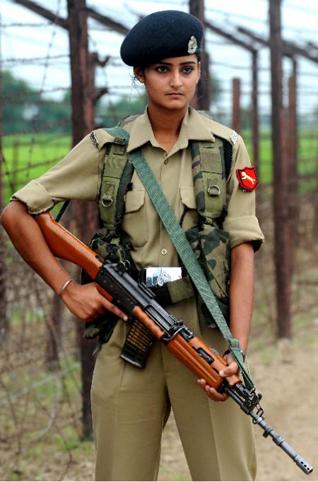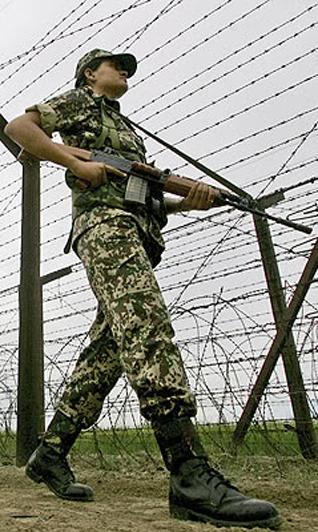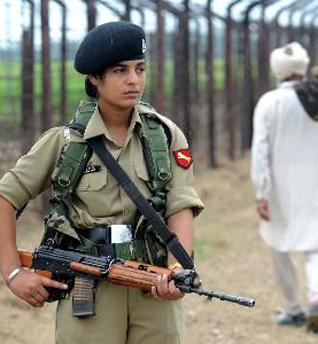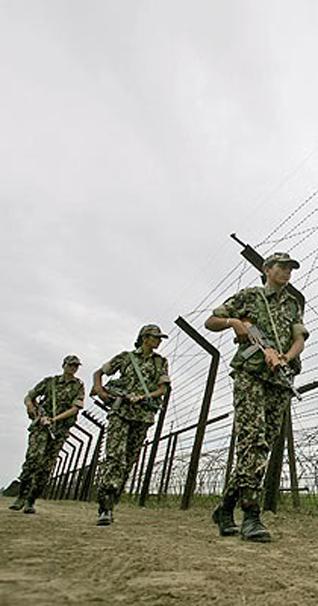Current Events
Now, Sikh Women Too Guard India's Borders
by RAMANINDER K. BHATIA
Every afternoon, Sukhwinder Kaur and her mother sat down to watch the afternoon soap in their sparsely furnished Hoshiarpur home but now that seems like a memory from another lifetime.
Though Sukhwinder and the other girls in her Khasa camp have been given a TV set, they are no longer interested in all the twists and turns of the family melodrama. The 22-year-old has plenty more to keep track of these days. Part of India's Border Security Force's first female contingent of border guards, one of her main responsibilities is guarding the treacherous Indo-Pak border at Punjab's Attari, and ensuring there is no smuggling of contraband.
"It feels different to have such a huge responsibility," Sukhwinder says, brushing a speck off her crisp uniform. "Life has changed for all of us. So have the priorities and notions of fear and safety. The country is all we have time to care for."
The women took charge in September after receiving training in weapon handling, intelligence gathering, border management, unarmed combat, frisking and guard duties.
They rise at 5.30 am and, after a quick breakfast - usually rotis and subzi at the Other Ranks mess - rush to collect their weapons from the armoury . They then report for duty and are ferried to their respective posts. After an entire day of checking and frisking, they reach the Attari border checkpost in the evening to report for crowd control duty during the Beating of the Retreat ceremony. Back on campus by 7.30 pm, most are ready to hit the sack after spending a little quality time with their fellows.
"Who has the energy or interest to watch TV serials after all this?" asks Amandeep Kaur, another recruit from among the 640 women who graduated this year from the BSF's subsidiary training camp at Kharkan, Punjab, after a 36-week preparatory period.
Though they took positions at the forward post to a tumultuous welcome from society and the government, followed, of course, by a media frenzy, most are still adjusting to a rough job at the 500 km-long border. A majority of them are barely out of their teens, excited as ever to wear a new piece of jewellery or get their hands painted with henna.
The first shock came days after they began work. Four rockets fired from Pakistan landed in nearby villages, forming deep craters. Many had never seen such a thing before. There was more. Soon after the missile incident, a clutch of vernacular papers carried stories, apparently quoting a Pakistani news site, that insinuated the women had been drafted for the pleasure of the male soldiers.
The motive was all too clear, but the bullet missed its target. "Those were attempts to demoralise us," Sukhdeep Kaur says. "But they failed miserably. If they so much as try to eye our border, our guns are ready."Â
As she frisks women farmers queuing up at gate number 112 in Daoke village, Amritsar, Sukhdeep orders one woman to let her hair down, and asks another to take off her shoes. "We have to do this," she explains. "It is easy to hide a small phone or a SIM card and get it across the border," she adds.
The BSF has deployed women guards to improve security checks on the border, as women are being used increasingly to smuggle narcotics.
As an afterthought, Sukhdeep says, "The nearest Pakistani village, Kot Jaimal Singh, is barely a kilometre away from where we stand. You can even see farmers across the border tending to their almost-ripe crop. There is nothing to suggest these are two different countries. Even the height of the paddy on both sides is the same."Â
But it's not just the women who have to make adjustments. Their male counterparts too are busy getting used to women in their midst.
"The men went through a reorientation programme and were briefed before the women were inducted. They are quite mindful of the women's privacy while treating them as colleagues . Fortunately, nothing amiss has been reported till now," said Inspector General (BSF) Himmat Singh.
If there is anxiety in some quarters, there is reassurance from others. "The women are disciplined and eager to work for their country. How can we not acknowledge and respect that?" says the assistant commandant, Aman Tirkey. "They are like our daughters and sisters. And most of us, whether male or female, have come from a similar background."
Apart from the crush and grind of daily work that unites them, there is something else that all the women agree on, being the first lot of women to guard India's borders is a matter of huge pride. "I have two younger brothers, both still in school, and my father is a farmer who tills three acres of land in Mansa," says Satveer Kaur. "I still remember what my father said the first time he saw me in my uniform. He said I was the eldest son. That meant everything to me. I don't mind the arduous patrolling anymore. I come from a place where girls have traditionally been considered inferior, even killed in the womb for a male child."Â
Chirpy and bright, 20-year-old Rajwant Kaur from Gurdaspur insists she's got an even better compliment. A smile spreading across her pretty face, she says, "I met a child sometime ago at Raja Ka Pul village, a stone's throw from the last Indian railway station at Attari. She said she wanted to be like me, wear a uniform and carry a gun, when she grows up."
 
[Courtesy: Times of India]
October 27, 2009
Conversation about this article
1: Kuldeep Singh (U.K.), October 28, 2009, 4:37 AM.
Wherever you go in the world, you will be proud to be a Sikh. No other religion gives you the tools to become a saint and a soldier.
2: Rajbee Kaur, Harbans Singh Mali (Hazur Sahib, Nanded, Maharashtra, India), November 24, 2009, 9:00 AM.
Ham sabhi aapke bohot aabhari hai ki aap sabhi sikh girl desh ki raksha kar rahe ho. Mujhe khud pe bohot naaz hai ki mai ek sikh girl hu or hamesha rahungi. Waheguru maharaj aapke hamesha ang sang sahai rahen, yahi hamari Waheguru maharaj se pray hai. Waheguru ji ka Khalsa, Waheguru ji ki fateh.
3: Harmit (Surrey, British Columbia, Canada), September 09, 2011, 9:33 PM.
May Waheguru always be with you and always give you strength and courage for the lifestyle you have adopted. Thank you for your sacrifices and I wish you all happiness and fulfillment of life and all successes to kiss your feet. I salute you, my sister Sikh soldiers.






